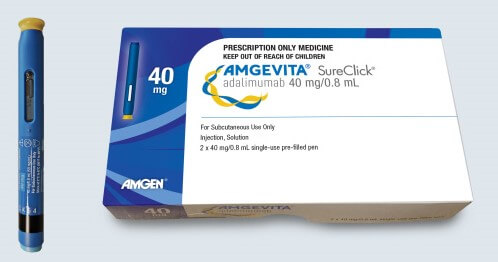Shipping is in a special cold chain box with data logger to ensure that it stays between 2-8 C until it arrives at your door. Humira (generic name: adalimumab) is a tumor necrosis factor blocker (anti-TNF) medication that can be used for the treatment of: Rheumatoid arthritis, which is a disease causing inflammation of the joints Juvenile idiopathic arthritis, a disease in children causing inflammation in the joints Psoriatic arthritis, a disease that causes inflammation of the joints along with red, scaly patches on the skin Ankylosing spondylitis, which is a condition involving long-term inflammation of the joints of the spine, especially where it joins the pelvis Crohn’s disease, a disease caused by inflammation of the gut. Prescribed for both adults and children aged six and over Ulcerative colitis, a disease causing both inflammation and ulcers in the lining of the gut. Humira is prescribed for adults and children aged five and older. When treating severe ulcerative colitis, it is unknown whether Humira is effective in people who have stopped responding to or could not tolerate other anti-TNF (Tumor Necrosis Factor) medicines Plaque psoriasis, a disease that causes red, scaly patches on the skin Hidradenitis suppurativa, a long-lasting skin disease that causes lumps, abscesses and scarring. Humira is prescribed for people aged 12 and older Uveitis, an inflammation beneath the white layer of the eyeball. Humira is prescribed for adults and children two years of age and older. Dosage Humira is administered via a subcutaneous injection. The dosage is according to the prescribing doctor’s instructions and may vary according to the specific condition being treated. The usual practice is for a patient to receive the first dose under the supervision of their healthcare professional, after which it is self-administered. Co-medication In rheumatoid arthritis and polyarticular juvenile idiopathic arthritis (JIA), Humira can be used for patients aged two or older, alone or with methotrexate. It can also be prescribed along with other non-biologic disease-modifying antirheumatic drugs (DMARDs) for adult rheumatoid arthritis. In psoriatic arthritis, Humira can be used alone or along with other DMARDs.
Brand Manufacturer: Abbvie
Side Effects: The most common mild side effect is inflammation at the injection site. Other side effects that should subside include headaches, rash, or cold symptoms such as stuffy nose, sinus pain, sneezing and sore throat. If these persist or worsen, report this to your healthcare provider or pharmacist. There are several possible severe side effects that must be reported to a doctor immediately. Medication must be discontinued at once. These include: Fever or night sweats Swollen glands A general feeling of illness or feeling light-headed Joint and muscle pain Skin rash, pale skin, easy bruising or bleeding Shortness of breath Cold hands and feet Pain in the upper stomach that spreads to the shoulder Loss of appetite Feeling full after eating only a small quantity Weight loss; Outbreak or worsening of psoriasis Sores or bumps on the skin that do not heal Signs of infections such as fast heartbeat, rapid breathing, raised temperature, feeling very ill, confusion, chills, severe drowsiness Signs of liver malfunction, such as jaundice (yellowing of the skin or eyes), body aches, tiredness, stomach pain (especially in the right upper quadrant), vomiting, loss of appetite, dark urine, clay-colored stools Signs of lupus such as patchy skin color that worsens in sunlight, joint pain or swelling, chest pain, shortness of breath Nerve problems like tingling in the extremities, numbness, dizziness, vision problems, weakness in the arms or legs Signs of tuberculosis such as ongoing cough with fever, weight loss
Indication: Tumor necrosis factor (TNF-alpha) molecules are present in various inflammatory conditions known as autoimmune diseases. Monoclonal antibodies are proteins made by blood cells to fight foreign particles in the body, such as TNF molecules. HUMIRA (adalimumab) is a fully human monoclonal antibody tumor necrosis factor blocker (anti-TNF) that works by recognizing and binding to TNF-alpha molecules and blocking them. Humira binds to TNF and inhibits its activity. This helps to reduce inflammation and limits damage to the affected organs or tissues. It is generally prescribed either alone or with other medications to reduce the symptoms of: Rheumatoid arthritis, which is a chronic inflammatory disease, characterized by inflammation and pain in the joints all over the body that progresses to irreversible joint damage. Humira is approved to treat moderate to severe rheumatoid arthritis in adults. Studies suggest that Humira taken in combination with methotrexate is more effective than either medication alone Psoriatic arthritis, which is a disorder associated with psoriasis. Psoriasis is a chronic skin disorder. Patients with this condition display symptoms such as pain and swelling in the joints as well as red patches with silvery scales on the skin Crohn’s disease and ulcerative colitis, which are forms of inflammatory bowel disease (IBD). Crohn’s disease is associated with the inflammation of the digestive tract, most commonly affecting the small intestine and the colon. Ulcerative colitis primarily occurs in the large intestine. Common symptoms of both disorders include abdominal pain and diarrhea. Humira is prescribed to patients already showing symptoms. It is generally considered as a replacement when other therapies have not worked. Plaque psoriasis, where inflammation causes red, scaly patches on the skin Hidradenitis suppurativa, which is a long-lasting skin disease that causes lumps, abscesses and scarring Uveitis, an inflammation beneath the white layer of the eyeball How long does Humira take to work? Patients using Humira generally begin to feel the drug’s effects from two weeks to three months. This can vary, depending on the disease for which they are treated. In patients with rheumatoid arthritis and psoriatic arthritis, symptoms can generally take between two weeks and three months to subside. Patients with Crohn’s disease usually start feeling relief from their symptoms from around four weeks. For patients with ulcerative colitis, it generally takes about eight weeks for the symptoms to subside. In patients with rheumatoid arthritis and psoriatic arthritis, symptoms can generally take between two weeks and three months to subside.

